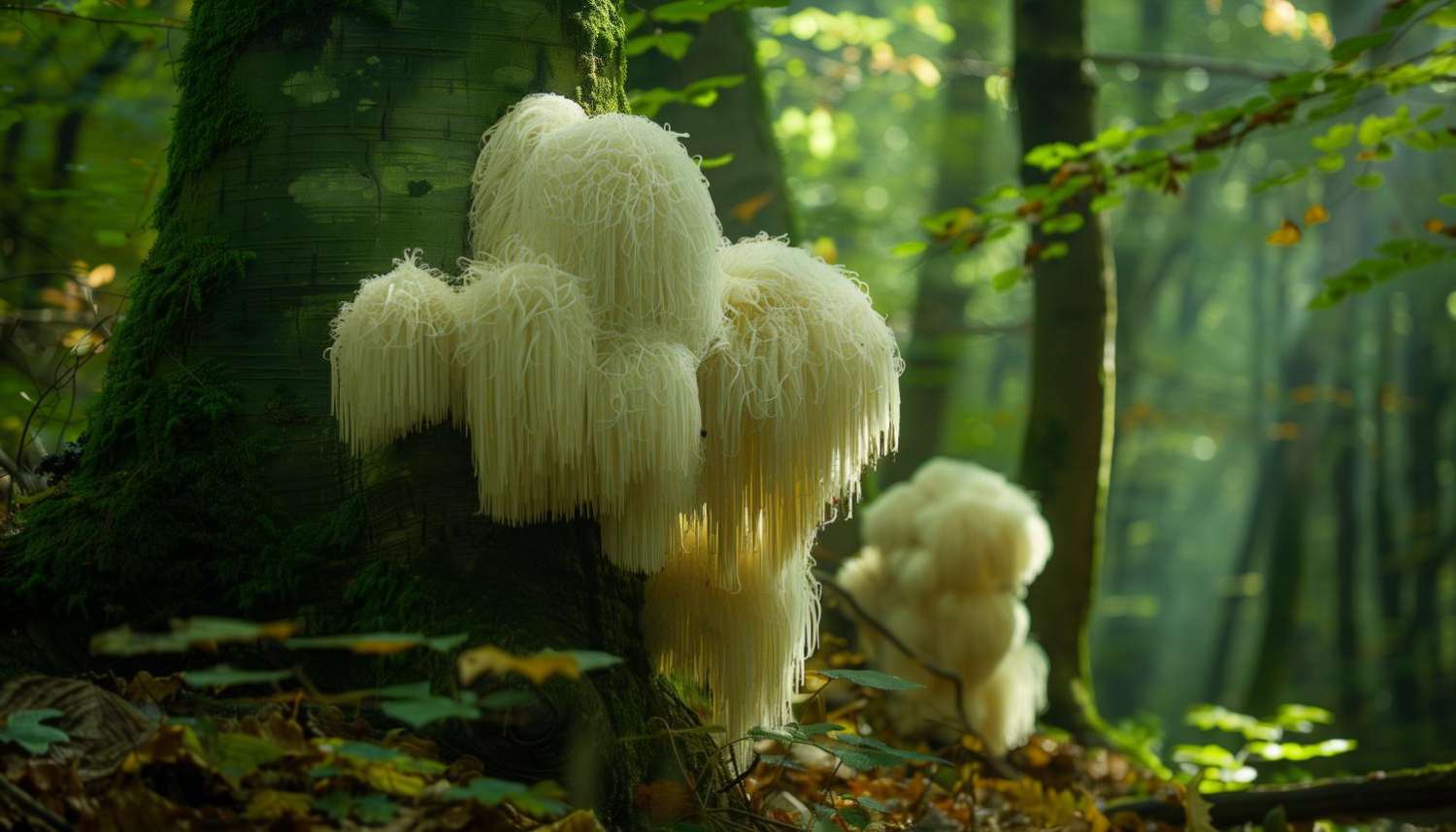Have you ever heard of the wig fungus, also known as Lion's Mane? This unique mushroom, with its distinctive mane-like appearance, has received a lot of attention in recent years for its impressive health benefits and culinary versatility. In this blog post we delve deeper into the world of the wig mushroom and discover why this mushroom can be a valuable addition to your diet and health.
What is the wig fungus?
The wig mushroom (Hericium erinaceus) is a striking mushroom that originates from East Asia. It has been used for centuries in traditional Chinese medicine and Japanese cuisine. The mushroom has a soft, hairy texture reminiscent of a lion's mane, hence the English name "Lion's Mane".
Health benefits of the wig fungus
1. Cognitive Protection
One of the most touted benefits of the wig fungus is its ability to improve brain function. Research has shown that the mushroom stimulates the production of nerve growth factor (NGF), a protein essential for the growth and maintenance of neurons. This can help protect against cognitive disorders such as dementia and Alzheimer's.
2. Neural Recovery
In addition to protecting the brain, the wig fungus can also help restore nerve cells. This makes it a potentially valuable supplement for people recovering from brain trauma or nerve damage.
3. Gastrointestinal Health
The wig mushroom also has digestive benefits. It can help strengthen stomach tissue and fight bacteria and infections in the gastrointestinal tract. This can contribute to better overall digestion and protect against stomach ulcers.
4. Anti-Cancer Properties
Some studies suggest that wig fungus may inhibit the growth of certain cancer cells. This is attributed to the mushroom's antioxidant and anti-inflammatory properties.
5. Immune System Boosting
The wig fungus can also strengthen the immune system by stimulating the production of immune cells and increasing the levels of immunoglobulins. This can help fight infections and improve overall health.
6. Mental Health
The wig fungus can also be beneficial for mental health. It has been shown to help reduce anxiety and feelings of depression by regulating neurotransmitters such as serotonin and dopamine. This can contribute to a better mood and overall well-being.
7. Antioxidant and Anti-Inflammatory
The antioxidant and anti-inflammatory properties of the wig mushroom may also be beneficial for conditions such as arthritis and inflammatory bowel disease. These properties help reduce inflammation and protect cells from free radical damage.
Culinary Uses of the wig fungus
1. Meat substitute
The wig mushroom is often used as a meat substitute in plant-based diets because of its firm texture and rich flavor. It can be used in a variety of dishes, from stir-fries to stews.
2. Gastronomic Delicacy
In Japanese and Chinese cuisine, the wig mushroom is considered a delicacy. It has a taste that is often compared to that of lobster or crab, making it a popular choice for luxury dishes.
3. Versatile Ingredient
The wig mushroom is a versatile ingredient that can be added to smoothies, soups, sauces and more. It is available in various forms, including fresh mushrooms, dried mushrooms, powders and supplements.
Use and Dosage
Forms
The wig mushroom is available in various forms, including whole mushrooms, extract powders and capsules. This makes it easy to incorporate the mushroom into your daily routine.
Dosage
A safe daily dosage of the wig fungus ranges from 1 to 2 grams. To promote nerve cell growth, a higher dosage of 3 to 5 grams is recommended. It is important to find the right dosage to avoid side effects such as dizziness, restlessness or stomach problems.
Legal Status
The wig fungus can be used legally in the Netherlands. Although it is not psychoactive and not addictive, picking the mushroom in the wild is not recommended due to its endangered status in the wild.
Safety and Side Effects
In general, wig mushroom is safe to use without significant harmful effects, even at high doses. However, some people may experience allergic reactions such as rashes or breathing difficulties. It is always important to start with a low dose and gradually increase it to see how your body responds.
Conclusion
The wig fungus offers a wide range of health benefits, from improving brain function to strengthening the immune system. In addition, it is a versatile culinary ingredient that can easily be incorporated into various dishes. Whether you're interested in the health benefits or just looking for a new taste experience, wig mushroom is definitely worth a try.
At Toshi Farm we are passionate about sharing the wonders of mushrooms with the world. Our high-quality, organic wig mushroom products are designed to help you enjoy the many benefits of this remarkable mushroom. Visit our website to learn more and find out how you can incorporate the wig fungus into your daily routine.
---
Frequently Asked Questions (FAQ)
What is the wig fungus good for?
The wig mushroom is good for improving brain function, strengthening the immune system, promoting digestion and protecting against certain cancers.
How do you eat wig fungus?
The wig mushroom can be eaten as a meat substitute in vegetable dishes, added to soups and sauces, or used in smoothies and other recipes.
Is the wig fungus edible?
Yes, the wig mushroom is edible and considered a delicacy in Japanese and Chinese cuisine.
Which mushrooms are medicinal?a
In addition to the wig mushroom, other medicinal mushrooms include Reishi, Chaga and Shiitake, all of which provide various health benefits.
With this information we hope to have given you a good insight into the many benefits and applications of the wig fungus. Try it yourself and discover the wonders of this unique mushroom!


